Ethiopia and EPA Negotiation 2008 - FES Ethiopia
Ethiopia and EPA Negotiation 2008 - FES Ethiopia
Ethiopia and EPA Negotiation 2008 - FES Ethiopia
You also want an ePaper? Increase the reach of your titles
YUMPU automatically turns print PDFs into web optimized ePapers that Google loves.
distinguish the” products entirely obtained in a country” from the “processed<br />
products.” 34<br />
One of the glaring weaknesses of the EBA scheme compared to the Interim <strong>EPA</strong><br />
<strong>and</strong> the Cotonou Partnership Agreement is its restrictive rules of origin. The EBA<br />
regime is weak in different aspects of rules of origin.<br />
First, the cumulation rules under EBA are more restrictive than the rules under the<br />
Interim <strong>EPA</strong>. Under the EBA, cumulation can occur with the European Union <strong>and</strong><br />
other beneficiary EBA countries while under the Interim <strong>EPA</strong> cumulation is<br />
allowed with ACP states, the EU <strong>and</strong> its OCTs <strong>and</strong> neighbouring developing<br />
countries that are not ACP countries. It is possible that a country that signed an<br />
Interim <strong>EPA</strong> using materials from other countries qualify for duty –free access to<br />
the EU market under the Interim <strong>EPA</strong> but not under the EBA scheme. Therefore<br />
there is more flexibility in the Interim <strong>EPA</strong> than there is in the EBA regime.<br />
In reality, however, the value of cumulation is not that apparent for <strong>Ethiopia</strong>, as<br />
there is little evidence that <strong>Ethiopia</strong> uses much material from other ACP<br />
countries in its manufacturing processes. In fact the EU is probably a more<br />
important trade partner for the purposes of cumulation <strong>and</strong> this is allowed under<br />
all regimes. Moreover, rules of origin will not be a major issue for importers <strong>and</strong><br />
exporters that are presently engaged in trade of primary agricultural products<br />
34 The key concepts of rules of origin are the following.<br />
Products entirely obtained in a country. Goods entirely obtained in a country largely refers to<br />
agricultural <strong>and</strong> food processing products such as vegetables, live animals <strong>and</strong> goods that are<br />
manufactured in the country exclusively from agricultural products <strong>and</strong> their derivatives.<br />
Processed products. When products are obtained in the country <strong>and</strong> contain goods which have<br />
not been “entirely” obtained there, it raises the question of knowing whether these obtained<br />
products must be considered as originating products or not. The criterion retained is the sufficient<br />
“working” or processing of materials which were not entirely obtained there. The working or<br />
processing conditions depend on the different protocols. These conditions appeal mainly to the<br />
criteria for tariff position change but also to the added value or the undertaking of a specific<br />
working.<br />
Cumulation rules. Within the framework of a bilateral preferential regime where products<br />
obtained from one of the contracting parties contain materials which are not entirely obtained<br />
there but utilize materials originating from the other party, the latter are considered as<br />
originating materials when they are incorporated in an obtained product. This principle is called<br />
the “bilateral cumulation.” Only materials not originating from the zone constituted by the two<br />
countries are considered for sufficient characteristic, or lack of, of the working or processing.<br />
Beyond the bilateral cumulation, there are enlarged systems of cumulation which include<br />
several country zones named “diagonal cumulation”.<br />
30 | P a g e







